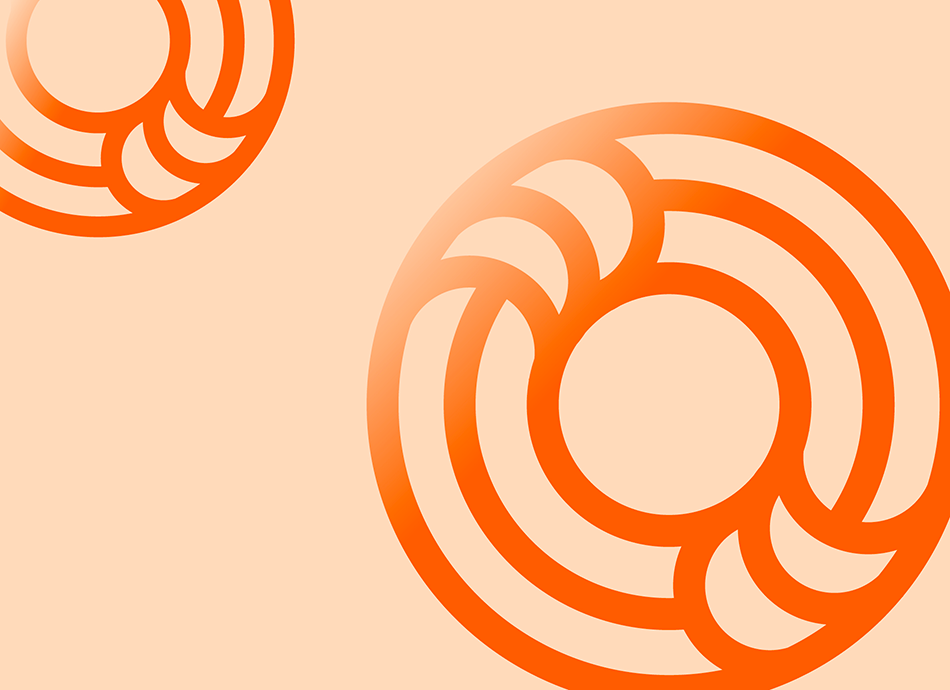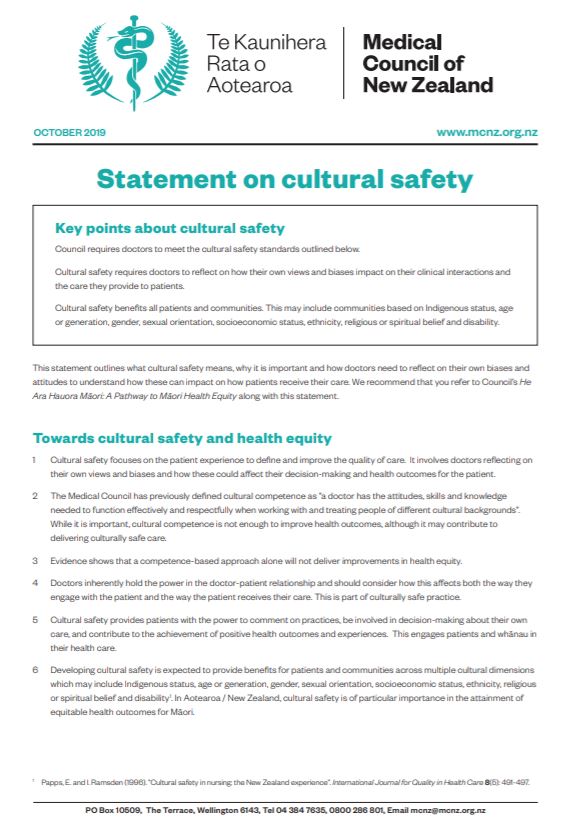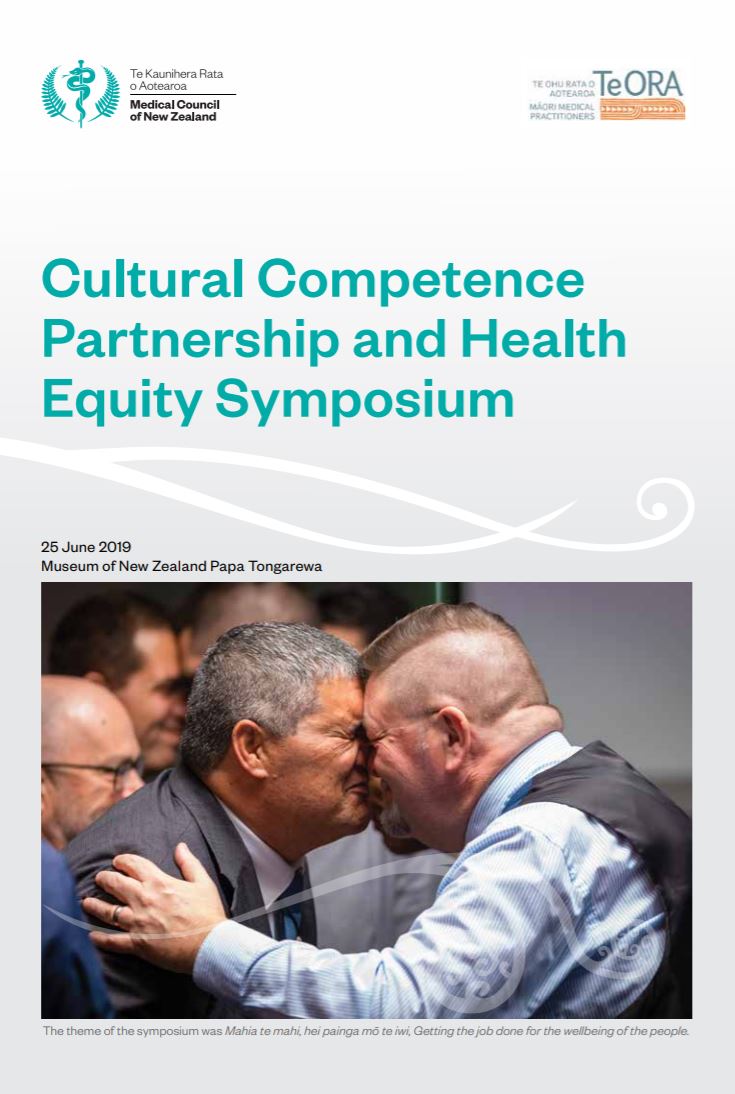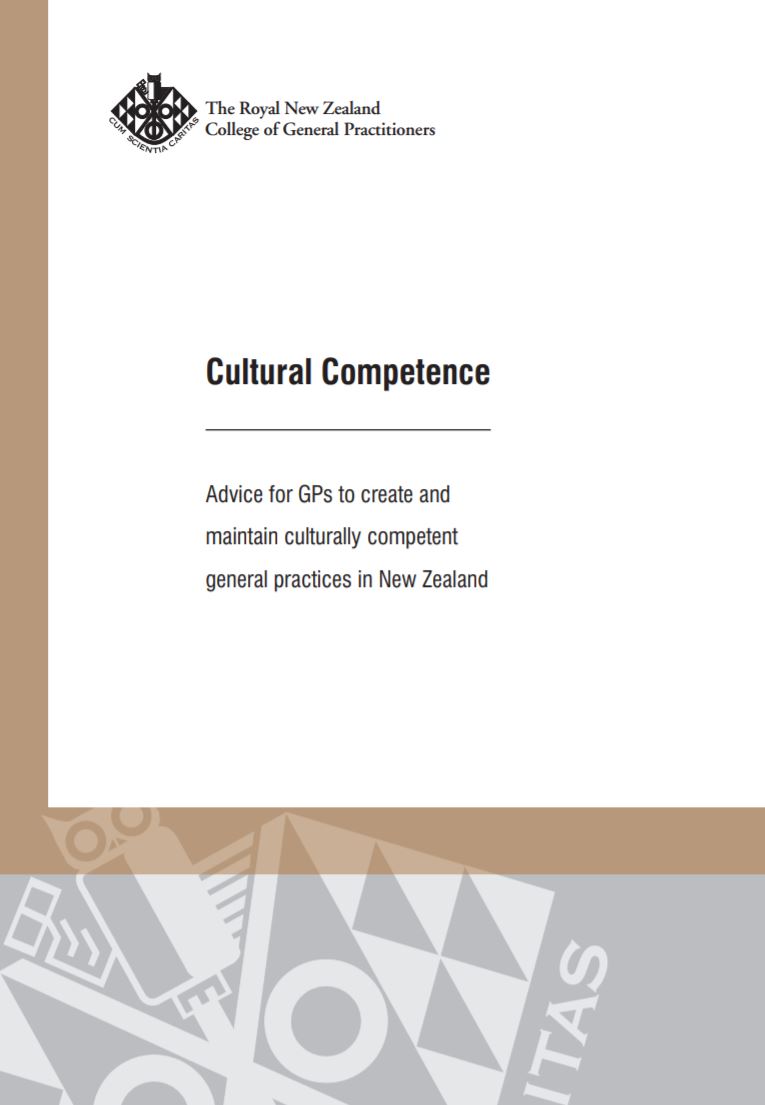If you're a frequent visitor to Healthify, why not share our site with a friend? Don't forget you can also browse Healthify without using your phone data.
Cultural competency and cultural safety for healthcare providers
Key points about cultural competency and cultural safety
- Cultural competency is the process of developing skills from another culture.
- Cultural safety involves self-reflection on the part of the healthcare provider on the potential impact of their own culture on their interactions with their patients.
- The goal of culturally safe healthcare practice is health equity.

Cultural competency is the process of developing skills from another culture to enable healthcare providers to effectively and respectfully work with and treat patients from other cultures.
Examples of developing cultural competency include:
- learning key words and phrases in another language (eg, greetings in te reo Māori)
- learning key concepts of another culture (eg, knowing that patients of Muslim faith fast during the Ramadan period; knowing that members of the LGBTQ+ community may prefer to choose their own pronouns beyond the binary sex they were assigned at birth.
Healthcare providers should take time to reflect on the cultural diversity in their community and consider what skills they may need to develop their cultural competency.
However, while developing cultural competency is important, it's now recognised that this isn't sufficient to achieve health equity. Culturally safe practice is required.
The Medical Council of New Zealand defines cultural safety as “the need for doctors to examine themselves and the potential impact of their own culture on clinical interactions and healthcare service delivery”. This definition is relevant to all healthcare providers.
The first step towards cultural safety is self-reflection, where the healthcare provider examines their own beliefs, biases, and attitudes towards other cultures.
This process can be confronting and challenging, as it requires honesty and a willingness to question deeply ingrained assumptions. However, it is a crucial step in acknowledging any unconscious biases and working towards overcoming them.
This process is not about feeling guilty for any privileges one may have, but rather understanding how those privileges can impact on others and how they can be used to promote cultural safety.
The ultimate goal of cultural safety is to provide equitable healthcare. In Aotearoa New Zealand, attaining health equity is of particular importance to Māori. However, the provision of healthcare in a culturally safe manner is expected to provide benefits across a wide range of individuals and communities including those who are at risk of inequity due to age, gender, sexual orientation, socioeconomic status, religious belief and/or disability.
It's important to acknowledge that cultural safety is not about treating everyone the same. In fact, it's recognised that treating everyone the same makes health inequity worse, not better.
Video: Cultural safety vs. cultural competence
This video from the Royal New Zealand College of General Practitioners (RNZCGP) explains cultural safety and how it differs from cultural competence.
(Anya Dai, NZ, 2020)
Video: Building a culturally safe practice for GPs
This video, also from the RNZCGP, explains how GPs (and others) can learn to practise in a culturally safe way generally, not just with Māori patients, and how cultural safety differs from cultural competence.
(Anya Dai, NZ, 2020)
A bias is when you are prejudiced against a person or group in a way that is unfair. You may not even be aware that you have a bias.
From the time we're born, we learn and take on beliefs and values about the world. We get most of our beliefs and values from our family, friends and the media. Even well-meaning people who don’t think of themselves as being biased have biases as part of their upbringing.
Understanding your biases is a really important part of cultural safety. It’s your biases that make you feel uncomfortable in new or unfamiliar situations. If you understand your biases, you'll be able to feel uncomfortable and not react badly.
Your biases act like ‘shortcuts’ and affect your thinking and actions, especially in situations where you are under pressure or in a new or complex situation. Health coaches are likely to be in all those situations.
Video: Prof. David Tipene Leach on: Understanding Unconscious Bias
Professor David Tipene-Leach gave a presentation at Hutt Valley District Health Board on ‘Why understanding implicit bias contributes to anti-racism and promotes equity’. The presentation was sponsored by Choosing Wisely and Eastern Institute of Technology Te Whare Takiura o Kahungunu, Hawke’s Bay. Watch the video below.
The learning and education videos below were developed for Wiki Haumaru Tūroro – Patient Safety Week 2019 by Health Quality & Safety Commission, NZ.
Module one: Understanding and addressing implicit bias
(HQSC, NZ, 2019)
Module two: Te Tiriti o Waitangi, colonisation and racism
(HQSC, NZ, 2019)
Module three: Experiences of bias
(HQSC, NZ, 2019)
Trailer: Who me – biased? He ngākau haukume tōku?
(HQSC, NZ, 2019)
Video: Optimising long-term condition management for Pacific People
In the video below, Debbie describes some of the findings described in this report.
Guidance
Te whānau Māori me o mahi – guidance on Māori cultural competencies for providers(external link) ACC, NZ, 2022
Tikanga – best practice for primary and community healthcare in the rohe of Ngati Whātua(external link) Te Kahu Pōkere & Ngāti Whātua, NZ
Training modules
Part A – facilitator guide modules 1 and 2 Training module or facilitator guide(external link) developed by Healthify He Puna Waiora and Health Literacy NZ
Part B – handout modules 1 and 2 Training handout(external link) developed by Healthify He Puna Waiora and Health Literacy NZ
Improving outcomes for Pacific patients – Soālaupule(external link) Goodfellow Unit, NZ
Soālaupule is an approach that creates equity by sharing power and decision-making. This short course helps us understand how to harness the power of Soālaupule to improve communication between health staff and Samoan and other Pacific families to assist with adherence to rheumatic fever (RF) management and treatment, including secondary prophylaxis.
Cultural competence for health professionals(external link) eCALD
These courses provide top tips for the provision of culturally competent and linguistically appropriate care for culturally and linguistically diverse (CALD) groups from Asian & Middle Eastern, Latin American and African backgrounds.
- With growing ethnic diversity in New Zealand, clinicians are increasingly more likely to care for clients with language, experiences, beliefs and cultures different from their own.
- Culturally competent care is central to the provision of quality, equitable and responsive services.
- Health practitioners and interpreters should be familiar with how to interact in virtual health consultations, especially with the need for stricter social distancing.
View courses for working with CALD patients(external link)
View guidelines and courses for health practitioners working with interpreters(external link)
View guidelines and courses for interpreters in the healthcare setting(external link)
View calendar of available remote F2F courses(external link)
You will need to register for an account or login to your existing eCALD account to access these courses.
Foundations in cultural competency(external link) LearnOnline
Understanding bias in health care(external link) LearnOnline
Foundation course in Māori cultural competency(external link) Mauri Ora
Test yourself
Quiz – understanding bias in health care [DOCX, 21 KB]
Quiz – understanding bias in health care answers [DOCX, 18 KB]
Harvard Implicit Association Test(external link)
Brochures
Statement on cultural safety(external link) Medical Council of New Zealand, 2019
Cultural competence partnership and health equity symposium(external link) Medical Council of New Zealand and Te Ohu Rata o Aotearoa (Te RA), 2019
Cultural competence(external link) RNZCGP, NZ, 2007
Lecture/webinar
Public lecture on meihana method for better understanding Māori patients' health needs(external link) University of Otago, NZ
Webinar – ACC cultural safety policy Kawa whakaruruhau(external link) ACC, NZ, 2023
General resources
Health equity assessment tool (HEAT)(external link) Ministry of Health, NZ
Te pae mahutonga Māori health models(external link) Ministry of Health, NZ, 2017
Māori health models – Te whare tapa whā(external link) Ministry of Health, NZ, 2023
Māori health models – Te wheke(external link) Ministry of Health, NZ, 2023
Medicines and older Māori(external link) He Ako Hiringa, NZ, 2021
Improving Māori health through clinical assessment: waikare o te waka o meihana(external link) New Zealand Medical Journal
The hui process – a framework to enhance the doctor–patient relationship with Māori(external link) New Zealand Medical Journal
Te aka Māori dictionary(external link)
Te reo Māori(external link) University of Otago, NZ
Tikanga best practice policy(external link) Waitematā and Auckland DHBs, NZ
- Hauora Māori (Māori health) competency(external link) Auckland Regional Health Pathways, NZ
- Curtis E, Jones R, Tipene-Leach D, et al. Why cultural safety rather than cultural competency is required to achieve health equity: a literature review and recommended definition(external link) Int J Equity Health 2019;18:174
- Statement on cultural safety(external link) Medical Council of New Zealand, NZ, 2019
Brochures

Medical Council of New Zealand, 2019

Medical Council of New Zealand and Te Ohu Rata o Aotearoa (Te ORA), 2019

RNZCGP, NZ, 2007
Credits: Healthify editorial team. Healthify is brought to you by Health Navigator Charitable Trust. Some content from the SMS Toolkit used with permission
Reviewed by: Claire Salter, Pharmacist, Tauranga
Last reviewed:


